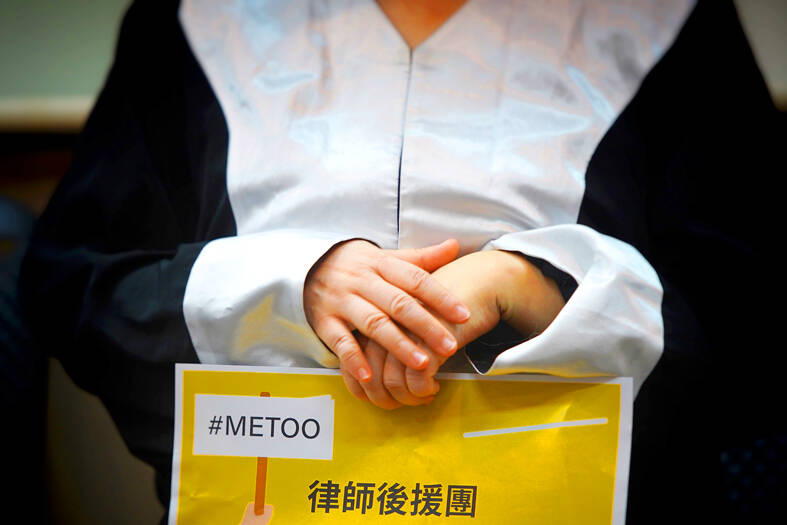The Taiwan Bar Association yesterday said it is teaming up with women’s groups to provide free legal counsel to #MeToo accusers, citing concerns that defamation laws are being used to silence victims of sexual abuse.
Accusers face tremendous pressure and social stigma that they are only seeking attention, National Alliance of Taiwanese Women’s Associations chairwoman Peng Yen-wen (彭渰雯) told a news conference at the Taiwan Women’s Center in Taipei.
Victims who go public with their accusations are often tried by the court of public opinion as well as the court of law, as abusers frequently use the considerable financial expenses associated with protracted litigation to intimidate their accusers, she said.

Photo: CNA
The project is a collaboration between women’s rights groups and lawyers to shield sexual abuse victims from frivolous or vindictive lawsuits, she said.
The project’s legal team consisting of more than 40 attorneys can be reached by calling (02) 8911-5595, and businesses can request a consultation on handling workplace sexual harassment by calling (02) 2388-3619, its spokesperson said.
The Garden of Eden Foundation saw a fivefold increase in sexual harassment complaints after it set up a hotline early last month, executive director Wang Yue-hao (王玥好) said.
Callers consistently expressed fears that they would not be believed and often asked for nothing more than a sympathetic ear, she said, adding that the legal advocacy project is intended as a remedy to systematic and institutional biases against victims.
Citing a survey conducted by the Ministry of Labor last year, Awakening Foundation secretary-general Chyn Yu-rung (覃玉蓉) said that 78.79 percent of working women reported being harassed at work without ever filing a complaint.
This figure suggests there is a lack of trust by women in their complaints being fairly investigated by the justice system and corporate workplace, she said.
The Awakening Foundation received numerous calls from corporations asking about possible steps they can take to protect employees from harassment following the rise of the #MeToo movement in Taiwan, she said.
The government should furnish the personnel and guidelines that businesses need to realize workplace gender equality, Wang said, adding that prevention and enforcement are equally important in curbing inappropriate behavior.
Neil Pan (潘天慶), a member of the legal team, said that #MeToo accusers are typically in an unequal power relationship with their alleged abusers, meaning that legal protections against reputational damage need to be recalibrated in cases revolving around abuse.
The courts should exercise caution in dealing with defamation cases around allegations of sexual abuse to avoid the weaponization of the law by abusers, he said, adding that awarding exorbitant damages would have a chilling effect on victims.

SECURITY: As China is ‘reshaping’ Hong Kong’s population, Taiwan must raise the eligibility threshold for applications from Hong Kongers, Chiu Chui-cheng said When Hong Kong and Macau citizens apply for residency in Taiwan, it would be under a new category that includes a “national security observation period,” Mainland Affairs Council (MAC) Minister Chiu Chui-cheng (邱垂正) said yesterday. President William Lai (賴清德) on March 13 announced 17 strategies to counter China’s aggression toward Taiwan, including incorporating national security considerations into the review process for residency applications from Hong Kong and Macau citizens. The situation in Hong Kong is constantly changing, Chiu said to media yesterday on the sidelines of the Taipei Technology Run hosted by the Taipei Neihu Technology Park Development Association. With

‘FORM OF PROTEST’: The German Institute Taipei said it was ‘shocked’ to see Nazi symbolism used in connection with political aims as it condemned the incident Sung Chien-liang (宋建樑), who led efforts to recall Democratic Progressive Party (DPP) Legislator Lee Kun-cheng (李坤城), was released on bail of NT$80,000 yesterday amid an outcry over a Nazi armband he wore to questioning the night before. Sung arrived at the New Taipei City District Prosecutors’ Office for questioning in a recall petition forgery case on Tuesday night wearing a red armband bearing a swastika, carrying a copy of Adolf Hitler’s Mein Kampf and giving a Nazi salute. Sung left the building at 1:15am without the armband and apparently covering the book with a coat. This is a serious international scandal and Chinese

A US Marine Corps regiment equipped with Naval Strike Missiles (NSM) is set to participate in the upcoming Balikatan 25 exercise in the Luzon Strait, marking the system’s first-ever deployment in the Philippines. US and Philippine officials have separately confirmed that the Navy Marine Expeditionary Ship Interdiction System (NMESIS) — the mobile launch platform for the Naval Strike Missile — would take part in the joint exercise. The missiles are being deployed to “a strategic first island chain chokepoint” in the waters between Taiwan proper and the Philippines, US-based Naval News reported. “The Luzon Strait and Bashi Channel represent a critical access

COUNTERINTELLIGENCE TRAINING: The ministry said 87.5 percent of the apprehended Chinese agents were reported by service members they tried to lure into becoming spies Taiwanese organized crime, illegal money lenders, temples and civic groups are complicit in Beijing’s infiltration of the armed forces, the Ministry of National Defense (MND) said in a report yesterday. Retired service members who had been turned to Beijing’s cause mainly relied on those channels to infiltrate the Taiwanese military, according to the report to be submitted to lawmakers ahead of tomorrow’s hearing on Chinese espionage in the military. Chinese intelligence typically used blackmail, Internet-based communications, bribery or debts to loan sharks to leverage active service personnel to do its bidding, it said. China’s main goals are to collect intelligence, and develop a